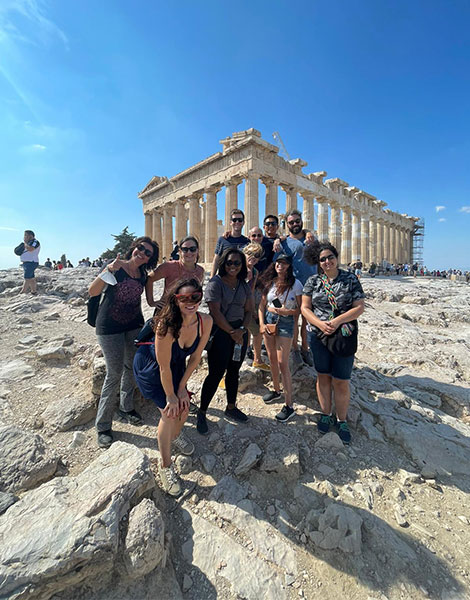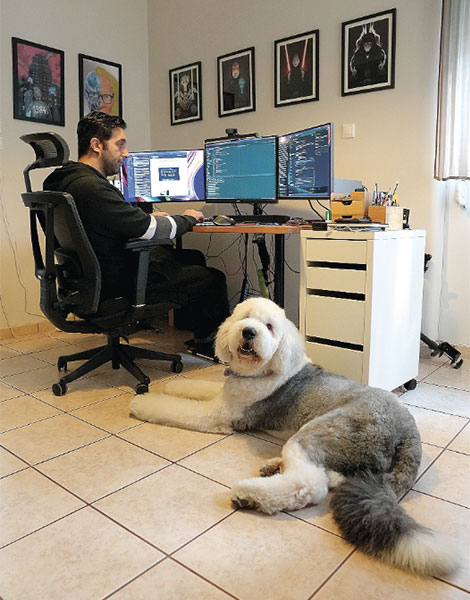Last Wednesday, Elizabeth Howell ordered a cappuccino and got ready for her business meeting. She organized all the files she would need on her screen and at six o’clock in the afternoon she connected via Zoom with her clients. “Good morning! How are you?” she said. For them, in America, it was morning. “Four years ago, I could never have imagined that one day I would be working from a coffee shop in Koukaki, as a communications consultant,” she says in a strong American accent.
She was born and raised in a small town in Alabama. After university, she worked – exhausting hours – as a lawyer. Her “Greek” story started in Nebraska, in November 2018: she was there hunting with her family, it was snowing and she stayed at the hotel. Her 30th birthday was coming up and she wanted to give herself the gift she had dreamed of for years, a trip to Greece. And indeed, that night she booked the tickets and the following summer she came to Greece. She got excited about the country and met Nikos, with whom she later kept in touch. She came back on vacation, until at one point she made a completely unexpected decision: to quit her job and move here. She would take a break to think about her following career steps, spend time with her boyfriend and basically explore the country she had come to love so much. “What could possibly go wrong?” she would say to her father who was worried about her decision.
She arrived in Greece on February 18, 2020. A week later, the first cases of coronavirus appeared and before she could think about what to do, the planet went into lockdown. Whatever plan she had was canceled and she struggled a lot. Out of the blue, a fellow student suggested that she should take over the social media of a company in America. The money was small but she started with enthusiasm. Today, four years later, she has a rich clientele in Germany, Africa and America and she works from Koukaki – or wherever else she happens to be. “I work with companies that before COVID did not have the flexibility to have me working for them from the other side of the world. This is perhaps the only positive legacy of the pandemic,” she notes.
Τhe American Tara Cappel – who deals with tourism – also noticed this trend and started designing Sojrn, a startup that basically takes care of everything related to aspiring digital nomads. After research, she came up with nine countries that she would suggest to them and Greece was among them. “First of all because I love your country but also because I had partners there that I trusted. You also have good WiFi and lots of accommodation options,” she explains.


Ten in Pangrati
This time last year, ten nomads settled in Pangrati. On their first day in Greece, they met with their “hostess,” Hara Papadoukaki. They walked around the neighborhood, she introduced them to the greengrocer, showed them the bus stop and gave them practical advice – from whether to drink the water to what to do with the toilet paper. They sat down for breakfast and there, they got to know each other better – they shared what they each do (lawyer, banker, writer, lobbyist, senior executives and business consultants) and their working hours. The hardest case was Jack, who worked for Sony Pictures in Los Angeles until three o’clock in the morning.
Everyone had an application installed on their mobile phone, where they could see the activities of each day before starting to work, such as Greek dance lessons, yoga lessons in the National Garden or philosophy lessons. As time passed, the team members came to make their own schedule. Tara would often go up to the Acropolis to have her morning coffee or they would go to exercise at Kallimarmaro. Late at night, after work, they would go out and every weekend they would organize excursions.
The cost of their participation started at $4,000 per month and included accommodation, access to their work space, activities and assistance from Hara and the Sojrn team in anything that came up, as for instance to fix the Internet connection (quite a common occurrence) or to check what happened when the main switch went down in the apartment building (as it turned out, it was Daniel’s fault, who worked for Wall Street and used his own modem because he was afraid of being disconnected). Hara had to look for a new mattress for a girl, return defective shoes but also argue over the phone with a taxi driver who wanted to charge 20 euros for the Syntagma – Pagrati ride. At the last group dinner, however, they were all excited and making plans to return. And indeed, four of them already have.
Ioanna Dretta, head of Marketing Greece (the organization founded by the Greek Tourism Confederation and the Hellenic Chamber of Hotels, aiming at promoting tourism), remembers that from the very first discussions with members of the Greek government about digital nomads, everyone agreed that they are an audience of special interest. Not only because they boost the economy but because they become the country’s best ambassadors. Last year around this time, she and her team raised funds (from Aegean Airlines, Cosmote and Eurobank) and created the workfromgreece.gr website, which contains all the information, tempting as well as practical. Although there are no recorded numbers on how many people have come to Greece for this purpose, they are watching the traffic on the website with great interest. First are the Americans, then come the Russians and the British. Mobility is usually high after the summer but also after specific events – such as, for example, by Russians when Putin announced that there would be a military draft.
Every day they receive various questions from people that are interested. These questions are about other nomad communities (besides Athens such communities exist also in Hania, Volos and Pilio), further clarification, or assistance. Some consulates are not even aware of the existence of the digital nomad visa that was established in 2021 by the Ministries of Foreign Affairs and Immigration to facilitate third-country nationals. Others wonder if their net income really needs to exceed 3,500 euros per month to get the visa (which is indeed a prerequisite).

© Josh Mojica

Bureaucracy
Anyone who meets the conditions for the visa and wants to stay for more than two years must obtain a residence permit. When Elizabeth from Alabama, who now lives in Koukaki, had to do so, Nikos took over the whole process without her having any difficulty. However, the experience of others who spoke to Kathimerini newspaper was different. Kate from England started trying to get her papers at the end of 2020. Having tried – in vain – to make an appointment over the phone with the relevant service, she decided to go there, but she was not accepted. She had to call the number before them to prove them that nobody answered and they finally let her in. Before they could even see what documents she had gathered, they handed her a printed paper with the list of the required ones. She was surprised to see that those were instructions intended for… pensioners (the printer had only printed the first of three pages).
Although it wasn’t quite clear what documents she had to gather, she searched and found the information she needed on the relevant English government page and when she submitted them, she was asked for an additional set of documents that she ultimately didn’t need. Αnother time, when she had to contact the police, the officer did not speak English, while along the way she was informed that the fact that her landlord was not the owner of her house but was subletting it to her was not acceptable (she finally asked a friend of hers to declare that he was hosting her). She remembers there were other cases just like hers: people who were usually accompanied by some lawyer, struggling to make Greece their home. “We felt like they wanted to prevent us,” she recalls. It took her over six months to get the permit but she didn’t give up. She still works from Greece ̶ in the summers from Milos and in the winters from Athens ̶ running a successful startup based in London.
And Greeks Who Work Abroad Without Emigrating
Of course, the new trend in employment does not concern only foreigners but also Greeks who now have the opportunity to work from here for companies abroad. One of them is Giorgos Rempousis. From time to time he had thought that it would be good for his career to emigrate (he is a programmer) but he had difficulty making the decision. However, when the department of the company he was working for closed down, he started looking from Greece for a job in America, England or Germany. He immediately found a job in a company in England (eight out of the nine colleagues in his old team found remote jobs, while the ninth moved to the Netherlands).
Giorgos is not considered a digital nomad but he is working remotely. Nothing has changed in his tax regime. The English company has entered into a contract with a company in Greece that has hired him. However, this is probably an exception. The legislative initiative for remote workers has not yet defined the framework for their tax and insurance treatment, thus leaving a significant legislative gap.
Mr. Rempousis explains to us that his schedule is quite flexible ̶ “you just have to be consistent.” Although he often misses the bond he had with his colleagues when he worked in the office, he notices that his new employers are trying to help their workers build relations even in this new working reality. Soon, he is going to travel to the English countryside to get to know his team better. They are going to plant trees together, meditate and have lots of conversation. But also in their everyday life, apart from online evenings with quizzes or board games and the book club, every week, everyone receives a so-called “donut.” It is a link they have to click on and spend about half an hour getting to know better one of their colleagues. Last week, Giorgos found himself talking to a Portuguese woman about Andros, his home island, the baby he is expecting and Ozzy, his dog who has become their mascot at meetings via Zoom.











